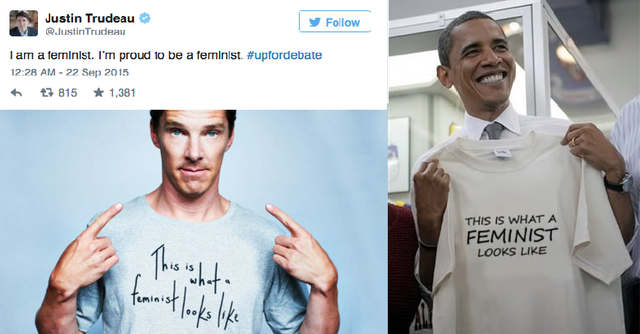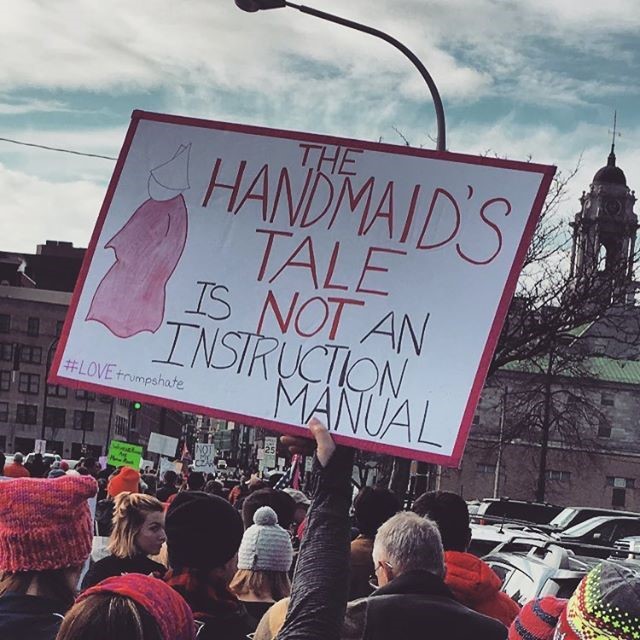A look at feminism through the eyes of a handmaid - The Handmaid's Tale

Every woman, at a certain point in her life, is confronted with feminism and each of us absorbs and interprets its legacy in a personal way. There is no definition of the “feminist” as such: she doesn’t have a race, nor a religion or a sexual orientation. She doesn’t belong to a specific social class and her daily job ranges from clerk to poet and from teacher to carpenter. It could be argued that she even has no gender, as demonstrated by the growing number of “feminist men” and feminist campaigns dedicated to the, once antagonist, other sex. The #HeForShe campaign, which stars the young actress Emma Watson as its spokesperson, is probably the best-known example of this trend. Personally, I see the birth of these new movements as a positive attempt to soften and, at the same time, restore the credibility of a concept that had become so threatening that women themselves felt ashamed in using it.

My story as a feminist has crossed different streams of ideas in different periods of my life, but I want to speak about a particular moment of truth that came recently, after watching a TV series based on Margaret Atwood’s popular novel The Handmaid’s Tale. I am very fond of dystopian books and movies, as I believe they are realistic portraits of where humanity is directed if we continue to elect the Trump-minded politicians as Head of States. I had a strong emotional reaction to this TV series that I could describe as a mixture of outrage and discomfort. However, my over-reaction was not due to the frightening scenario depicted, but more because of the message sent to the audience.
To explain myself better, I need to briefly introduce the novel. The Handmaid’s Tale, was written in 1985 by Margaret Eleanor Atwood. The author was introduced to the feminist dialogue going on in the ‘60s during her universities studies; however, she always refused to label her literary production as strictly “feminist”. Concerning The Handmaid’s Tale, she claimed that she did not intend to make a political statement, her aim was in fact to produce “a study of power and how it operates and deforms or shapes the people who are living within that kind of regime”.
The tale narrates the story of Offred, who lives in the Republic of Gilead, ruled by a theonomic dictatorship based on the deprivation of any right for women. The vast majority of the citizens are infertile, and the human population is decreasing sharply: the few women who can still have children are kidnapped and become the Handmaids. The Ceremony, a religious-based ritual that comprises the Commander fucking a Handmaid between the legs of his Wife, takes place every month. The life of the Handmaids swings from beatings and mutilations to rape. The Wives are locked at home and humiliated. The Aunts are the sadistic guardians of the Handmaids: generally old and infertile, this is their only chance of survival. All other women are either Marthas (servants), Jezebels (prostitutes), or simply Unwomen (who are usually sent to the Colonies where, shortly after, they die).
In spite of how its author described The Handmaid’s Tale as a “story of a new form of misogyny, women’s hatred of women”, what I assisted to was, instead, the apotheosis of the “Man versus Woman” tragedy, depicted with unprecedented harshness. The camera, fixed on the bodies of the Handmaids, is without mercy, the viewer cannot lower her eyes. I could feel the shame of those women as my shame, their submission was my submission. In my mind, I was begging them to react, because nobody should ever see a woman being treated like that, not even in fiction.
This is not the kind of feminism I am looking for, a feminism based on an antagonism with men that is obsolete and detrimental. As I said before, women have found a different level of engagement that brings about actual change and not purely makes some noise. Feminism is evolving towards the conception of women and men working side by side to fill the gap between genders that do exist. The Handmaid’s Tale, exactly because it has the pretence to be a feminist production, is damaging for the conception of feminism that we are trying to build. What makes me angry is that a TV series that reached an audience of thousands of people all around the world was passing forward such a “bigot” feminist message.

I prefer to think about The Handmaid’s Tale not as a feminist story but just as a dystopic one in a broader sense. Under this light, the TV series well-accomplishes different purposes. For example, the story can be seen as a memento of our past of masters and slaves, very actual in a period of racial crisis as the contemporary. Or it can be approached as an expression of the anti-Trump campaign, advocating for freedom of choice and sexuality for women. A debate about the role of women is crucial at this moment in history and I want to recognize the effectiveness of this thought-provoking piece of television in putting women’s rights in the spotlight. Nevertheless, being at the centre of the attention should not be seen as the ultimate objective: policies are the ones that last not fire. We can start with “Nolite Te Bastardes Carborundorum!” but only if we recognize that there is much more to work on.
Resteemed your article. This article was resteemed because you are part of the New Steemians project. You can learn more about it here: https://steemit.com/introduceyourself/@gaman/new-steemians-project-launch
Thank you! But have you read it? What do you think about my opinion on this topic? I'm looking for people who are interested in what I write about, I'd like to exchange ideas and have feedbacks. I'm very young and eager to learn and become a better journalist! I'm also curious about experimenting with new platforms. But I'm not interested in likes for the sake of liking. For me, it's really all about the quality of the content not the number of shares. :D
Are you sure feminism has become threatening? It really seems to be the complete opposite.
Look at the men that participated in gamergate and the men at Donald Trump's campaign rallies in 2016. If you think anyone is intimidated by feminism theses days I would argue that you're misreading it.
Feminism is quite innocuous currently. Do you see it differently?
No, I agree! This is exactly the point I'm trying to make. What I am arguing is that feminism has found new ways to emerge as a movement that encompasses both men and women and is not anymore based on a contraposition between the two genders. This is exactly why feminism has stopped (or is stopping, perhaps?) to be a "threatening" or even "shameful" word, to reach instead its core: which is equal rights for women and men. What I am saying is that this TV series, although very well-directed, stands against these new trends and brings feminism back to the "fight against the man" concept.